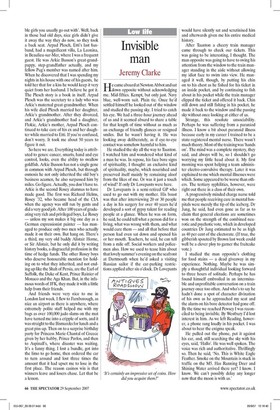Invisible man
Jeremy Clarke He came aboard at Newton Abbot and sat down opposite without acknowledging me. Mid-fifties. Kempt, but only just. Navy blue, well-worn suit. Plain tie. Once he'd settled himself he looked out of the window and studied the passing sky. I tried to catch his eye. We had a three-hour journey ahead of us and it seemed absurd to share a table for that length of time without as much as an exchange of friendly glances or resigned smiles. But he wasn't having it. He was looking away deliberately, as if eye-to-eye contact was somehow harmful to him He studied the sky all the way to Taunton. I watched him and wondered what kind of a man he was. In repose, his face bore signs of spirituality, I thought: an exclusive kind of spirituality, maybe, which nourished and preserved itself mainly by remaining aloof from the likes of me. Or was it just a touch of wind? If only Dr Lovepants were here.
Dr Lovepants is a semi-retired GP who used to go out with my mother. His boast was that after interviewing 20 or 30 people a day in his surgery for over 40 years he'd developed a sort of gypsy talent for reading people at a glance. When he was on form, he said, he could tell what a person did for a living, what was wrong with them, and what would cure them — and all that before that person had even sat down and opened his or her mouth. Teachers, he said, he can tell from a mile off. Social workers and policemen also. How we used to tease him about that lovely summer's evening on the seafront at Dartmouth when he'd asked a visiting Russian sailor if the car-parking restrictions applied after six o'clock. Dr Lovepants would have silently sat and scrutinised him and afterwards given me his entire medical history.
After Taunton a cheery train manager came through to check our tickets. This was going to be interesting, I thought. The man opposite was going to have to swing his attention from the window to the train manager standing in the aisle without allowing my idiot face to swim into view. He managed it well, though, by putting his chin on to his chest as he fished for his ticket in an inside pocket, and by continuing to fish about in his pocket while the train manager clipped the ticket and offered it back. Chin still down and still fishing in his pocket, he made it back to the window and the passing sky without once looking at either of us.
Strange, this resolute unsociability. Perhaps he was suffering from a paraniod illness. I know a bit about paranoid illness because early in my career I trained to be a state-registered mental nurse. There wasn't much theory. Most of the training was 'hands on'. The mind was a complete mystery, they said, and always will be, so I shouldn't go worrying my little head about it. My first morning was spent helping a team administer electro-convulsive therapy. Later it was explained to me which mental illnesses were which. Some appeared to be worse than others. The tertiary syphilitics, however, were right out there in a class of their own.
A progressively minded charge nurse told me that people receiving care in mental hospitals were merely the tip of the iceberg. Dr Jung, he said, had even gone as far as to claim that general elections are sometimes won on the strength of the combined neurotic and psychotic vote, which in developed countries Dr Jung estimated to be as high as 40 per cent of the electorate. (If true, the gibberish spouted by Brown last week could well be a clever ploy to garner the fruitcake vote.) I studied the man opposite's clothing for food stains — a dead giveaway in my experience. Nothing. Maybe he was simply a thoughtful individual looking forward to three hours of solitude. Perhaps he has found himself embroiled in an interminable and unprofitable conversation on a train journey once too often. And who's to say he hadn't done a spot of character divination of his own as he approached my seat and the alarm on his bore detector had gone off. By the time we reached Pewsey I was reconciled to being invisible. By Westbury I'd lost interest in him As we left Reading, however, a phone rang loudly in his pocket. I was about to hear the enigma speak.
He pulled out the phone, put it against his ear, and, still searching the sky with his eyes, said, 'Hallo'. He was well spoken. The voice was rich and authoritative. Thrillingly so. Then he said, 'No. This is White Eagle Feather. Smoke on the Mountain is stuck in traffic on the M5. Has Running Deer and Shining Water arrived there yet? I know. I know. We can't possibly delay any longer now that the moon is with us.'























































 Previous page
Previous page